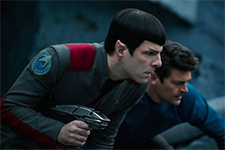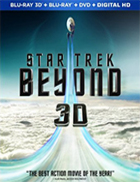Star Trek Beyond
|  Star Trek Beyond is the first film in the millennial rebooted series not to be directed by J.J. Abrams, and you can immediately feel the difference. Having jumped ship for the new Star Wars franchise, Abrams left the director’s chair open to Justin Lin, who has spent the last decade directing Fast & Furious sequels, one of which (2011’s Fast Five) counts as one of the best entries in the franchise. In each of those films Lin moved his action aesthetic further and further away from the laws of physics, which makes his move toward an action movie set in space a natural extension of his increasingly cartoonish proclivities. Outer space, with its lack of gravity and endless expanses, offers him an entirely new canvas for objects moving very, very fast in and around giant explosions, although the entire middle section of Star Trek Beyond is firmly grounded on an Earth-like planet. You can almost feel Lin chomping at the bit to get the action back to a ginormous space station with multiple fields of gravity. Lin’s takeover of the Star Trek universe isn’t necessarily better than Abrams’s two films, Star Trek (2009) and Star Trek Into Darkness (2013)—the latter of which is roundly despised by a vocal chorus of Trek fans for reasons that still escape me—but it certainly feels different, and sometimes a change of pace is a nice thing. Interestingly, that is precisely how the film, which was penned by Simon Pegg (who plays the ship’s engineer Scotty) and Doug Jung, begins, with the crew of the U.S.S. Enterprise boldly going where no man has gone before—for the 966th day of a five-year mission. The crew is starting to feel the weight of time and the sameness of routine, particularly Captain James T. Kirk (Chris Pine), who is so desperate for a change of pace that he is considering a promotion to admiral, which will raise his stock but keep him grounded for the rest of his career (this plot point and the fact that it is his birthday both recall 1982’s Star Trek II: The Wrath of Khan, which remains a perennial touchstone for the franchise). Kirk’s first officer, the half-Vulcan Spock (Zachary Quinto), is also considering a change of career to ambassador, possibly because his relationship with communications officer Uhura (Zoe Saldana) is at an end. Meanwhile, McCoy (Karl Urban), the on-board doctor, is just as grumpy and irascible as ever, while we learn that chief navigator Sulu (John Cho) has a husband and Chekov (the late Anton Yelchin) prefers Scotch to vodka. The Enterprise crew gets their change of pace after docking at Yorktown, an enormous Federation space station, where they are given the assignment of flying through a distant nebula to find a lost ship. Turns out the whole mission is a ruse designed to lure them into a massive trap sprung by Krall (Idris Elba), a decidedly bitter alien hell-bent on getting his mitts on the Abronath, a piece of an ancient weapon that Kirk has in his possession. While Krall is a fairly rote Star Trek villain—a humanoid like so many from the ’60s television show, just much better designed and articulated—he commands what turns out to be the film’s most unique and enthralling visual conceit, an army of thousands and thousands of small, single-pilot ships that mass and swarm like angry bees and are capable of cutting through just about anything, including the Enterprise, which is literally sawed into pieces in the middle of space and sent crashing and burning to the surface of the craggy planet that Krall calls home. Also calling this planet home is Jaylah (Sofia Boutella), a white-faced alien who is the sole survivor of another group that was lured into Krall’s trap. She has been making her home in the abandoned U.S.S. Franklin, an outdated Federation ship that went missing a century earlier. The crew of the Enterprise is split up, with a good chunk of them being captured while other small groups are scattered about, trying to figure out how they can escape Krall’s clutches and stop him before he gets back to Yorktown with his newly created device o’ destruction. Granted, the plot is a lot of familiar boilerplate, but what Star Trek Beyond lacks in originality and daring, it makes up for with sheer energy and enthusiasm. Lin sometimes stages the action with too much frenetic intensity, resulting in blurs of violence that we have to simply accept and move on. At other times, though, he puts together scenes that provide a real rush, such as Kirk’s use of a motorcycle to create an Evel Knievel-like diversion and the aforementioned destruction of the Enterprise, which is done with a brutal sense of majesty that is undercut only by the fact that we’ve seen it happen before (in both 1984’s Star Trek III: The Search for Spock and 1994’s Star Trek: Generations). This being their third outing together, the cast has settled into their roles nicely, with Pine and Quinto’s Kirk and Spock suggesting a deep-seated camaraderie that needs few words, while Spock and Urban’s McCoy continue their humorously entrenched sense of conflict. The effects are big, but for the most part the film avoids that tiresome cliché of mass destruction, although a third-act action sequence that finds various ships ripping in and around the massive buildings inside Yorktown (which recall like the landscape-bending dream sequence in Christopher Nolan’s Inception) constantly toys with it. In many ways, Star Trek Beyond is a more modest film than its immediate predecessors, with ambitions that don’t go much farther than using familiar characters and situations to show the audience a rollicking good time. That it may ultimately be remembered as the Star Trek movie in which the Enterprise crew saves the day with some help from the Beastie Boys may not be at all a bad thing.
Copyright © 2016 James Kendrick Thoughts? E-mail James Kendrick All images copyright © Paramount Home Entertainment | |||||||||||||||||||||||||||||||||||
Overall Rating: 

 (3)
(3)


